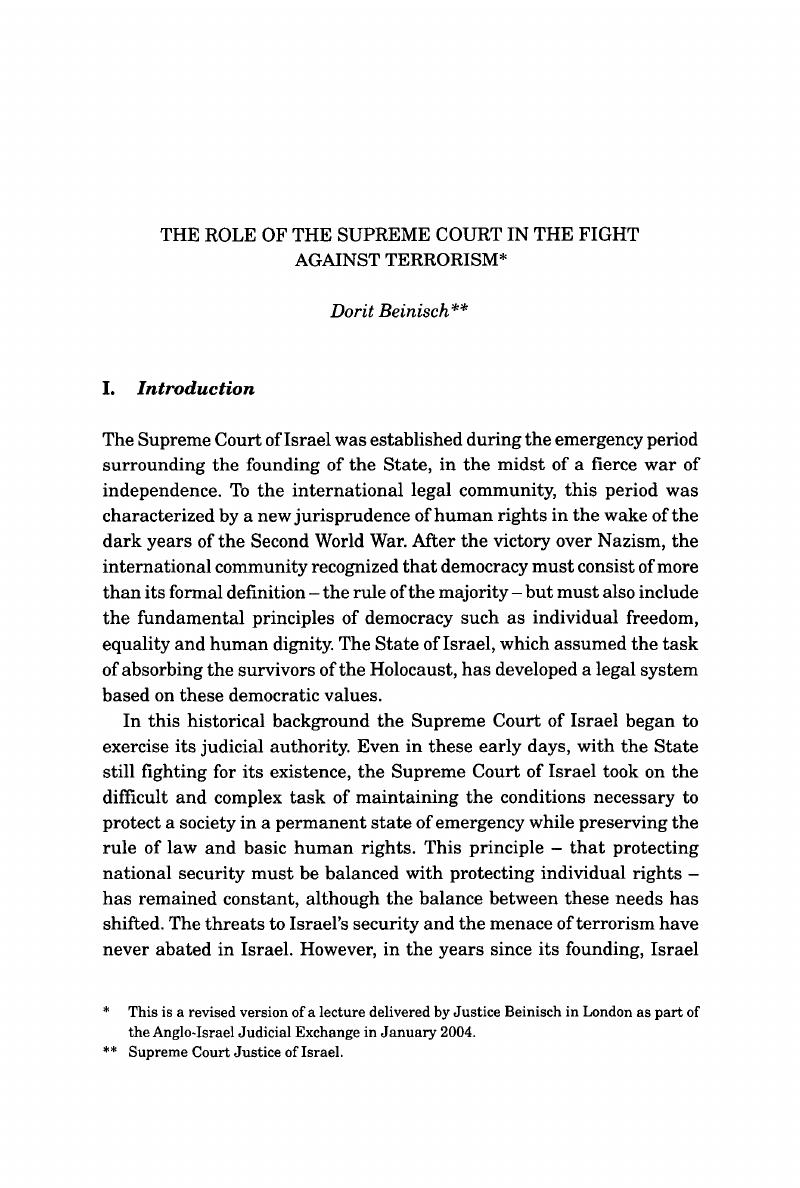No CrossRef data available.
Published online by Cambridge University Press: 04 July 2014

Supreme Court Justice of Israel.
1 H.C.J. 3451/02 Almandi v. The Minister of Defense 56 P.D. 30.
2 From its earliest days, the Israeli legal system adopted the English Common Law approach, namely that customary international law constitutes an integral part of domestic law, so long as it does not explicitly contradict domestic legislation. The situation is different with respect to international treaty law (international conventions which Israel has ratified, where they do not reflect customary international law). International treaty law does not constitute part of Israeli domestic law unless it is explicitly adopted by legislation incorporating the provisions of a particular convention into domestic law. However, some conventions have served as the basis for domestic legislation enacted by the Knesset. In those situations, the conventions constitute part of the legislative history of the domestic statutes. Further, in order to minimize the gap between Israel's international obligations and their de facto implementation in domestic law, the Supreme Court abides by an interpretive presumption that domestic law does not contradict international treaties to which Israel is a party. According to this rule of interpretation, a court interpreting domestic law must accord substantial weight to Israel's international obligations.
3 The 1907 Hague Convention on the Laws and Customs of War is generally seen as customary law. Israel's official position on the Fourth Geneva Convention of 1949, on the other hand, is that the Convention does not apply to the territories because it does not reflect customary law. Nevertheless, the Court has not hesitated to apply the Fourth Geneva Convention in ruling on petitions challenging the activities of the military in the territories. It has done so on the basis of a commitment given by Israel's attorney general, more than 30 years ago, that Israel would abide by the humanitarian provisions of the Fourth Geneva Convention.
4 See for example: H.C.J. 3239/02 Marab v. IDF commander in the West Bank 57(2) P.D.; H.C.J. 1890/03 Bethlehem Municipality v. State of Israel (not yet published) in paragraph 15; See also Beinisch, Dorit, “The Rule of Law in Times of Conflict” (2004) 17 IDF Law Review 19, 29–32 Google Scholar [in Hebrew].
5 See for example: H.C.J. 4764/04 Physicians for Human Rights v. Commander fo the IDF Forces in the Gaza Strip (not yet published).
6 H.C.J. 7015/02 Ajuri u. IDF Commander in West Bank 56 (6) P.D. 352.
7 H.C.J. 3239/02 Marab v. IDF Commander in the West Bank, supra n. 4.
8 H.C.J. 5591/02 Yassin v. Commander of the Kziot Military Camp 57(1) P.D. 385; H.C.J. 3278/02 The Center for the Defense of the Individual v. Commander of the IDF Forces in the West Bank 57 (1) P.D. 385.
9 Justice Beinisch in H.C.J. 4764/04, supra n. 5.
10 H.C.J. 3451/02, supra n. 1; H.C.J. 3436/02 The International Custodian of Terra Santa v. The Government of Israel, 56 P.D. 22.
11 Justice Dorner in H.C.J. 2936/02 Physicians for Human Rights v. Commander of IDF Forces in the West Bank 56 P.D. 3.
12 H.C.J. 3114/02 Barake v. The Minister of Defense 56 P.D. 11.
13 H.C.J. 5100/94 Public Committee Against Torture in Israel v. The State of Israel 53 (4) P.D. 817.
14 H.C.J. 2056/04 Beit Sourik Village Council v. The Government of Israel (not yet published). Shortly after this decision of the Supreme Court of Israel was published, the International Court of Justice published its advisory opinion on the security fence. See: Legal Consequences of the Construction of a Wall in the Occupied Palestinian Territory (Adv. Op., 9.7.04).
15 H.C.J. 1890/03, supra n. 4.
16 H.C.J. 7007/03 Kawasme v. IDF Commander in the West Bank (not yet published).
17 President Barak in H.C.J. 4764/04, supra n. 4.